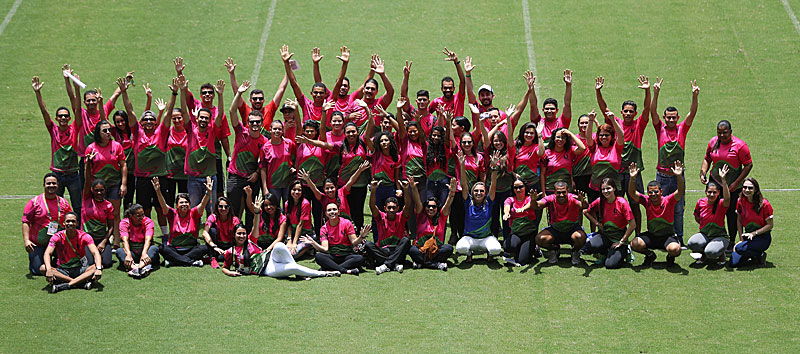
GOIANIA – The Brazilian University Sports Confederation (CBDU) will present its first group of volunteers prepared for major events, today, 17 October, at the Excellence Center of Sport, in Goiânia. The entity created the CBDU Volunteers Academy, which forms its first 300 volunteers after the training in the manners defined by the International University Sports Federation (FISU).
“CBDU is using FISU’s investment in empowering people around the world to improve and perfect the volunteer department. It is a global idea, instituted by FISU, and that CBDU is now following”, says the president of CBDU, Luciano Cabral. “From now on, we have, permanently, the CBDU Volunteers Academy. The idea is to train volunteers throughout the year, enabling them to not only work in the university events of Brazil and FISU, but also to serve all the sporting events of our country,” completes the leader, who will open the event.
 The CBDU Volunteer Department was established three years ago, but will now train volunteers using the tools and knowledge acquired at the FISU Volunteers Leaders Academy, held this July in Kazan, Russia. Volunteers will be prepared to receive almost 7,000 people involved in the Brazilian University Games 2017 (JUBs), which are the largest university competition in Latin America.
The CBDU Volunteer Department was established three years ago, but will now train volunteers using the tools and knowledge acquired at the FISU Volunteers Leaders Academy, held this July in Kazan, Russia. Volunteers will be prepared to receive almost 7,000 people involved in the Brazilian University Games 2017 (JUBs), which are the largest university competition in Latin America.
In all, there will be 300 approved volunteers, among more than 1,000 participants in the volunteering recruitment process of the JUBs Volunteer Programme, trained through lectures and dynamics in the areas of health, shuttle, tourism, lodging, law and media.
FISU Volunteers Leaders Academy
In July, in Kazan, Russia, FISU hosted a volunteer leadership programme, the FISU Volunteers Leaders Academy.
The event brought together over 100 volunteers from 91 countries. They shared practices related to volunteer projects for major international events. The event counted on classes, lectures by professionals experienced in volunteering at large events, evaluations, debates and exchange of experiences among the participants.
Paula Leal Vasconcelos, a post-graduate student in Marketing and Advertising, represented the CBDU in the event and, today, she is a fundamental piece for the implementation of the Brazilian Volunteers Academy.
“The FISU Volunteers Leaders Academy was outstanding and made me see how important volunteers are for any event, be it sport or not. This Tuesday, we will promote integration work, games and talks to train the volunteers and show them how great a sporting event of this size is”, said Paula, who has experience as a volunteer coordinator in the JUBs 2013 and 2014, as well as in the Confederations Cup (2013), the World Cup (2014), the Olympic and Paralympic Games in Rio (2016).
About the Brazilian University Games 2017
This year, the 26 States in Brazil and the Federal District will participate in the competition, adding up to about 7,000 participants among leaders, technical committees, athletes, referees, volunteers and the Organizing Committee.
There will be 20 sports: athletics, badminton, judo, swimming, tennis, table tennis, beach volleyball, chess, basketball, futsal, 3 x 3 basketball, handball, taekwondo, Academic, e-sports (FIFA and League of Legends) and volleyball. Swimming, table tennis and athletics will also be played in the para sport.
The Brazilian University Games (JUBs) will be held in Goiás, from 19 to 28 October. The event is an achievement of the Brazilian University Sports Confederation (CBDU) and the University Sports Federation of Goiás (FGDU), with support from the Federal Government, through the Ministry of Sports, and the Government of the State of Goiás, through the State Department of Education, Culture and Sport of Goiás (Seduce).
The opening ceremony will take place on Thursday 19 October, with a Brazilian concert, as well as the flags entrance and the lighting of the Olympic pyre.
(Source: CBDU)

